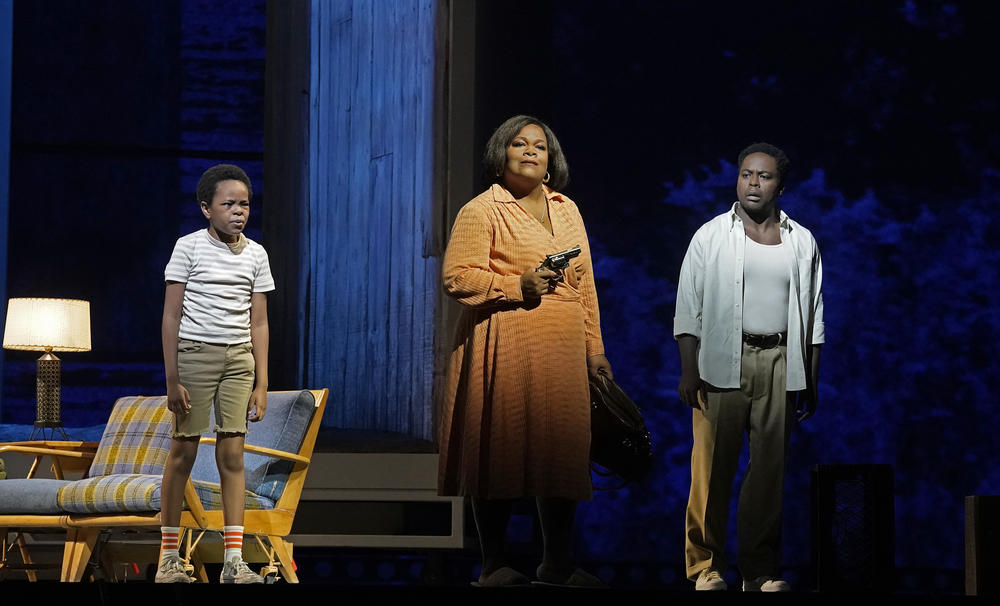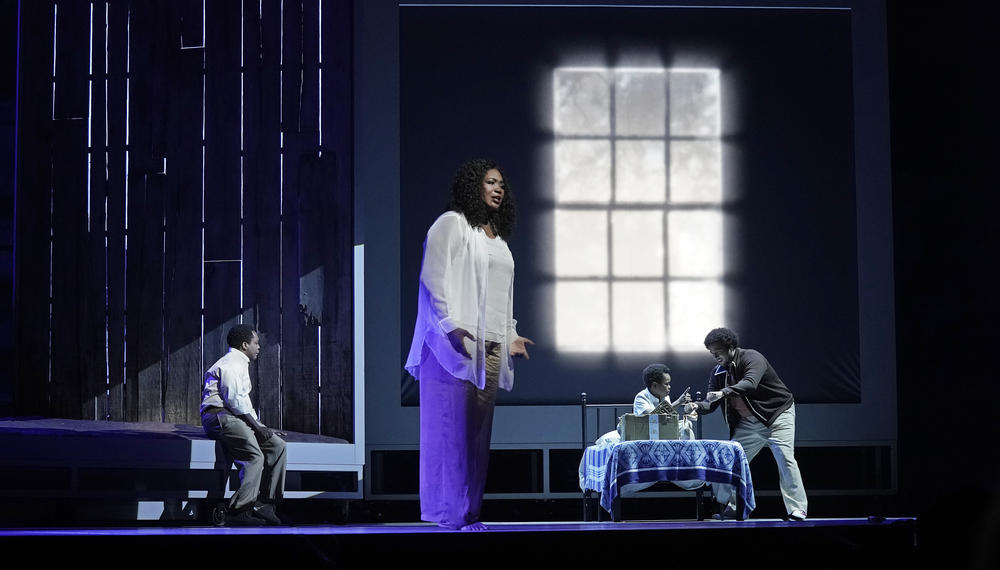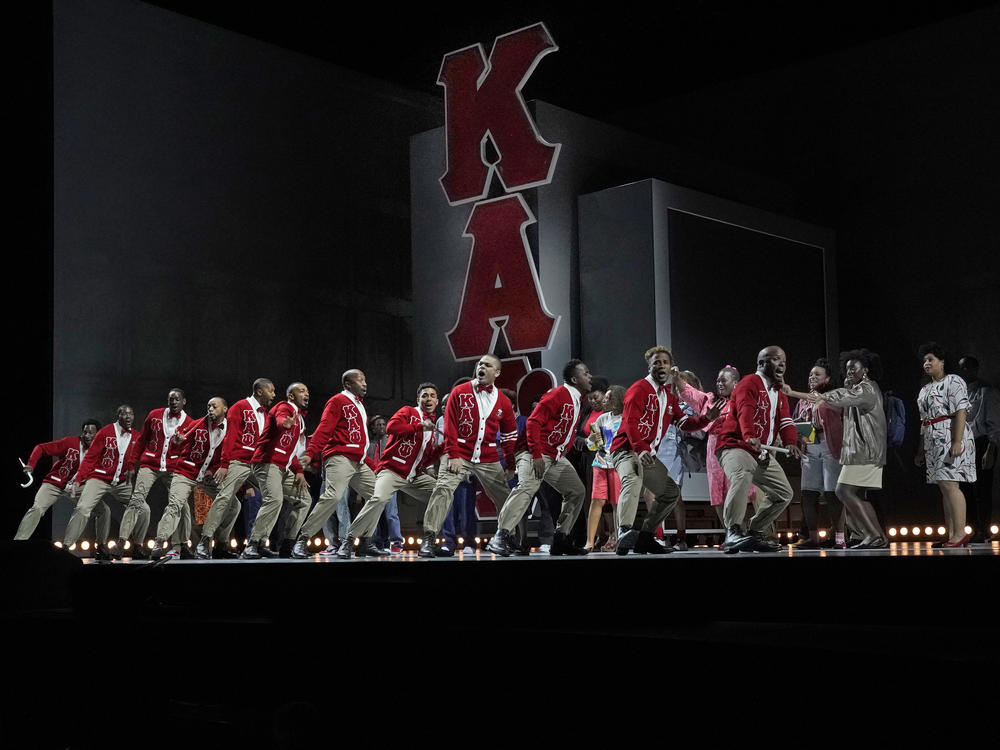Section Branding
Header Content
Terence Blanchard's Met Opera Debut Is A Singular Achievement And A Shared Success
Primary Content
Again and again in Fire Shut Up in My Bones, the magnetically powerful new opera by Terence Blanchard, the focus returns to the torturous weight of a burden carried alone. That weight, shouldered by the opera's central character, stems from his sexual and emotional abuse as a child, and the resulting pain and alienation of his young adulthood. The struggle is singular and interior, but it unfolds in grand scale against a hum of community, family and society.
That crucial relationship, between individual and collective, forms an irresistible meta-narrative for Fire Shut Up in My Bones, which has already made history as the first work by a Black composer to be presented by The Metropolitan Opera. The audience and the company basked together in this breakthrough during a stirring, momentous premiere at The Met on Monday night. And what was perhaps most remarkable about the performance was the clear, untroubled confidence with which Blanchard and his collaborators carried the weight of expectations.
The Met commissioned Fire in 2019, following its well-received premiere at Opera Theatre of St. Louis (which had also presented Blanchard's first opera, Champion). But the piece had not been planned as a season opener, let alone the first work to be presented after a long pandemic closure. Peter Gelb, general manager of The Met, has acknowledged that the Black Lives Matter movement, which intensified a conversation around representation last year, informed his decision to fast-track and prioritize this piece for the current season.
Blanchard, 59, may be best known as a multiple Grammy-winning jazz trumpeter and bandleader — his latest album, Absence, was released just a month ago — but he has carved out no less distinguished a career in film music, notably through a longstanding association with Spike Lee. Opera is a recent area of endeavor for him, but also the continuation of a musical influence he traces to his father, a devoted amateur singer. And in Fire, he found a subject, a setting and a region of inquiry that could fully engage his capacious musical imagination. He isn't the obvious choice to break The Met's 138-year streak of operas by white composers, but as Monday's triumphant performance showed, he was the right one.
Part of that rightness stems from Blanchard's air of humility, and the inclination to see himself as part of a continuum. In a recent conversation for WBGO Members during a break in rehearsals at The Met, he emphasized the communal nature of this production. "One of the beautiful things about this for me is that it doesn't belong to me," he said, referring not only to co-directors James Robinson and Camille A. Brown, but also librettist Kasi Lemmons and the rest of his creative team — including the all-Black cast. "And here's the thing that I think makes the most powerful statement," Blanchard added. "They all see themselves in these characters. You know what I mean? That's the thing that's really pushing or driving the work that's being done."
Fire Shut Up in My Bones was adopted from an affecting memoir by Charles M. Blow, which combines a hardscrabble coming-of-age story with a trauma narrative, a search for self-identity and a reckoning with the limits and possibilities of Black masculinity. So the opera's main character is Charles, embodied with brilliant gravity and charisma by baritone Will Liverman. A boyhood version of Charles, known as Char'es-Baby, is portrayed by the impressively poised young actor and singer Walter Russell III. Among the other marvelous standouts are Latonia Moore, imbuing Charles' mother, Billie, with vibrant emotional presence; and Angel Blue, who assumes three pivotal roles, including the personifications of a pair of intangible forces, Destiny and Loneliness.
Blanchard's music for Fire is glowingly consonant but full of subtle harmonic and timbral surprises (along with strategic flickers of dissonance). Composing for film has conditioned him to serve the story, onstage or onscreen, without a trace of vanity. And few orchestrators in our time have so organic an understanding of crescendo and pulse, which Blanchard uses in the opera to amplify emotional stakes, rather than the mechanics of plot. Often a chordal color shift illuminates a state of mind, as in the fraught moment in Act II when Loneliness presents herself as Charles' only steadfast companion, truer even than family.
Strikingly, given Blanchard's profile as a jazz artist, Fire eludes description as a "jazz opera." Its language is avowedly classical, with elements drawn from the canonical composers, like Puccini, that defined Blanchard's early exposure to the art form. But the smooth deployment of extended jazz harmony, often in breathing, fleeting passages, marks the piece as modern — as does the work of a rhythm section nestled within the orchestra, which in this production included Adam Rogers on guitar, Matt Brewer on bass and Jeff "Tain" Watts on drums.
Working with Lemmons' evocative libretto, which manages a shifting balance of plainspoken and poetical, Blanchard finds select passages in the text to add a vernacular flourish. "African-American singers in the opera world, when they come to this world, they are told to turn off their heritage," he told me. "Well, the thing that we talked about in the very first meeting of rehearsal, if you will, is that I want them to bring all of that back into this."
There's a moment in Act I when Billie, describing the travails of their rural Louisiana community, sings "They so tired," putting a pronounced blue shading on "tired." Later, her wayward husband, Spinner, seduces her with a promise of physical attention — and when he sings "your tired, aching feet," his emphasis on the word is a precise echo, in feeling and inflection. Elsewhere in the opera, Blanchard inserts daubs of gospel vocality, and not just during a tragicomic set piece featuring a Southern baptism. "I bend, I don't break, I sway," sings Liverman at a determined juncture, filling the phrase with a heavy depth of feeling.
Form follows function throughout Blanchard's work, and in Fire he finds musical resonance in a harboring bond with the natural world; in the rhythms of work and home life; in the bluff, bantering talk among men and boys, especially Charles' four older brothers. ("Why am I lonely in a house full of noise?" he cries, in one of Lemmons' many lines that spark a laugh even as they leave a mark.) The vile transgression at the heart of the opera — Charles' molestation by an older cousin, Chester — is presented in utter stillness, with a tremulous quiet that magnifies its horror. A scene that hinges on Charles' later yearning for comfort and affection ("Kiss me, love me, hug me, see me") comes paired with a lilting theme in 5/4 meter, in a fluently romantic mode that would sound at home in one of Blanchard's film scores.
The vivid intensity of all this energy onstage — including Allen Moyer's ingenious set design, a movable framework conveying minimalist rusticity — was received with ebullient rapture in the room. A season opener at The Met is always a glittery affair, at the moneyed intersection of high culture and high fashion. On this evening, a conspicuous concentration of Black excellence in the audience — Jon Batiste could be seen giving hugs in the aisle at intermission, and I spotted pianist Jason Moran with his wife, mezzo soprano Alicia Hall Moran — helped impart a markedly different feeling. (Another contributing factor: the universal mask and vaccination requirement that allowed for full capacity.) What might have seemed under different circumstances like some kind of incursion registered instead as a symbol of arrival: We here.
The Met has stated its intention to incorporate more operas by Black composers going forward — beginning with Anthony Davis' groundbreaking X, which will be staged in 2023 with Liverman in the title role as Malcolm X. That these changes are so long overdue felt beside the point on Monday; they were happening, right now. The supreme assurance in every aspect of Fire, including the tactile specificity of its story, sharpened that in-the-moment sensation. All other considerations were brushed to the periphery, where they remained just within view.
The opera contains a few notable dramatic departures from Blow's memoir. In one moment, Billie barges into Spinner's gig at a local juke joint, brandishing a gun — a confrontation that any jazz fan will connect to the tragic death of trumpeter Lee Morgan at Slugs' Saloon. (In his memoir, Blow describes his father as a former musician, not a working one, and while the confrontation with the gun did happen, it was not in a club but at home.)
The juke joint set piece — like the gospel church service and a scene at the chicken processing plant where Billie toils — lands with the profound force of authenticity, as a rare window on Black life, at least one version of it, in an operatic setting. Act III opens with the boisterous extravagance of a fraternity step routine, choreographed by Brown as a manifesto of irrepressible Black joy. Just as it was worth marveling at what it meant for Beyoncé to bring HBCU marching band traditions to the trendy masses at Coachella, it was staggering to witness this jolt of proud kinetic Blackness on the Metropolitan Opera stage. (When the routine was over, the audience let loose a sustained cacophony of cheering applause.)
Blanchard has been gracious in his recognition that other Black composers long ago deserved the chance he's been given on opera's biggest stage, and in his hope that he isn't a mere token. But he and his collaborators also seized the opportunity, making Fire an undeniable declaration of their assertive presence. And it's especially powerful that that this history-making work comes not out of a heroic tradition but rather a journey of self-discovery and awakening. Charles learns that he doesn't need to bear that burden alone, and that he never truly did.
"This isn't the end," he vows, as the opera draws to its conclusion. "Now my life begins." As the company emerged for a raucous round of encores, joined by Blanchard, conductor Yannick Nézet-Séguin and even a beaming Blow, it was impossible not to think about what was ending in that moment, and what might be beginning.
Copyright 2021 WBGO. To see more, visit WBGO.



